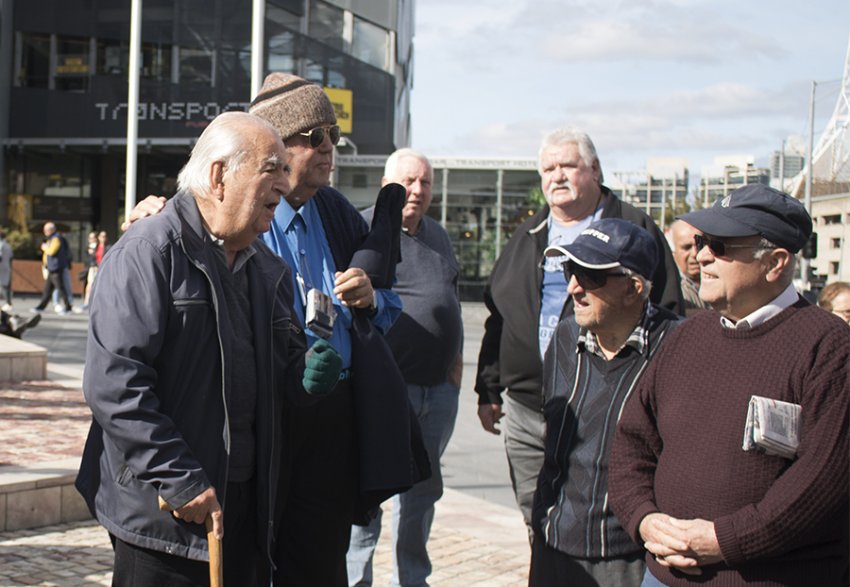
Communist, trade unionist and class-struggle fighter for migrant rights George Zangalis died on March 25. Radicalised during the Greek civil war at the end of World War II, Zangalis remained a fighter until the end.
Despite the Communist Party of Greece leading substantial sections of the anti-Nazi Resistance movement during World War II, after the Nazi occupation of Greece ended in 1944, the British and United States military forces, with the support of pro-Nazi elements in Greece, defeated the communist government and handed back power to the right-wing royalists.
Zangalis came to Australia as a political refugee in 1950. Firmly believing in working-class people’s right to run society, he joined the union, the Communist Party of Australia (CPA) and became active in the Greek Democritus Workers’ League.
Angered by the punitive treatment of the mostly migrant workers at his first job at General Motors Holden (GMH), he took part in a number of strikes.
The 1964 national strike of GMH’s 18,000, mainly migrant workforce was the result of their treatment including not being able to have a lunch break.
From 1961–1969, Zangalis was a CPA organiser before taking a job on the Victorian Railways. His focus was on involving migrant workers in the union and encouraging unions to take up their rights.
At Zangalis’ memorial, Rail Tram and Bus Union state secretary Luba Grigorovitch described how, as the president of the North Melbourne Laurens Street Workshop Committee in 1972, Zangalis pushed for migrant workers to be able to learn English on the job.
In the 1970s, the railways employed a 55% migrant workforce but because many didn’t have enough of the language, they did not understand critical safety issues let alone how to better their wage and work conditions.
Zangalis was elected as an Australian Railways Union (ARU) organiser in 1975 and became president in 1988. He led the 1976 dispute of the Victorian Rail Car Cleaners and Freight Workers in West Melbourne who occupied the Railway Administration Building in Spencer Street and they won their demand for separate lunch and dressing rooms.
Later, in the early 1980s, railway infrastructure workers blockaded the front of Public Transport Commission headquarters with a cavalcade of work trucks, tractors and bulldozers.
Between 1982 and 1984, Zangalis was involved in a successful campaign to improve amenities for maintenance and construction works, including winning — for the first time — air-conditioned depots, separate eating and toilet facilities, air-conditioned vehicles and portable toilets.
Throughout these struggles, Zangalis continued to campaign for English classes on the job and for multi-lingual information to be provided.
In 1973, he helped organise the first migrant workers’ conference, drawing delegates from workplaces across Victoria. The meeting was conducted in English, Italian, Greek, Yugoslav and Spanish and represented a new inclusion by unions of migrant workers.
His 2009 book Migrant Workers and Ethnic Communities: Their Struggles for Social Justice and Cultural Rights. The Role of Greek-Australians documented the history of migrant workers’ campaigns.
Zangalis was a founding member of the Ethnic Communities Council and the Federation of Ethnic Communities Councils of Australia, as well as Ethnic Community Broadcasting. He was key to establishing the country’s first multilingual access community radio station 3ZZ in 1975. It was shut down by the Malcolm Fraser government but later re-established itself as 3ZZZ. He maintained his weekly Greek program for more than 30 years. The struggle to maintain the radio station is documented in his book From 3ZZ to 3ZZZ. A Short History of Ethnic Broadcasting in Australia. Zangalis was also President of the National Ethnic and Multicultural Broadcasters’ Council of Australia from 1995 to 2009.
His radical activities meant that Australian Security Intelligence Organisation (ASIO) considered him a person of interest, building up 44 files on him. In 1953, ASIO’s Victorian director HC Wright proposed that he be deported to Greece, saying he was an “undesirable alien”.
For 23 years, Zangalis was denied citizenship. To highlight that injustice, he stood for the CPA in the Melbourne electorate of Bruce, held by then immigration minister Billy Snedden. Basically a publicity stunt, because non-citizens could not stand, Snedden refused his fresh application.
Eventually, after a change of government, Zangalis was granted citizenship in 1973 enabling him to visit family in Greece for the first time.
Zangalis was the vice president of the Fair Go for Pensioners Coalition and was a contributor to Green Left.
At his 90th birthday, Grigorovitch recalled that Zangalis had told a friend: “You must never step away from the fight to make the world a better place. You must fight injustice in all its forms.” This is an apt summary of his life’s work.
[The Zangalis family is asking for help to digitise George’s ASIO files. The BSB is 313 140 and Account Number is 123254453.]